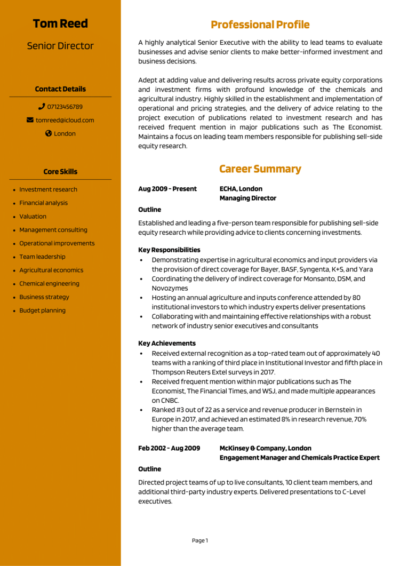Are you ready to trade your current high-paying job for… an even better one?
As an Executive, you’re the captain of the corporate ship. But before you steer a new organisation to success, you’ll need a CV that’s as commanding as your presence in the boardroom.
This guide, complete with 6 Executive CV examples, will show you how to craft a CV that highlights your achievements, leadership style, and the strategic value you bring to any organisation.
Executive CV example
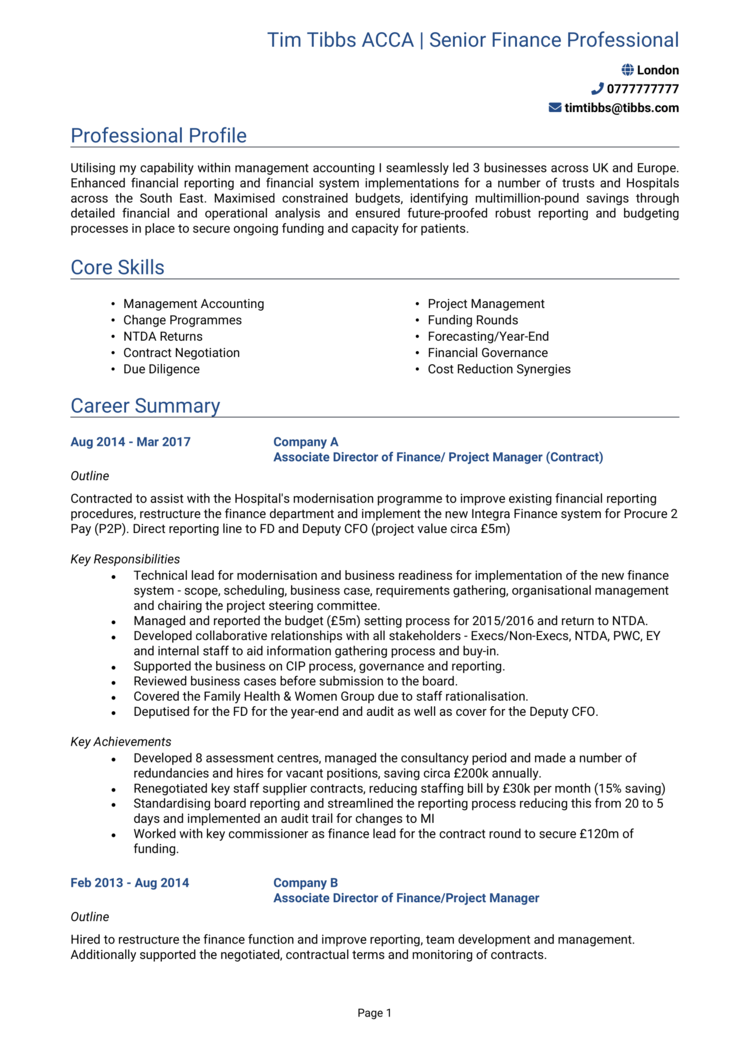
Managing Director CV example
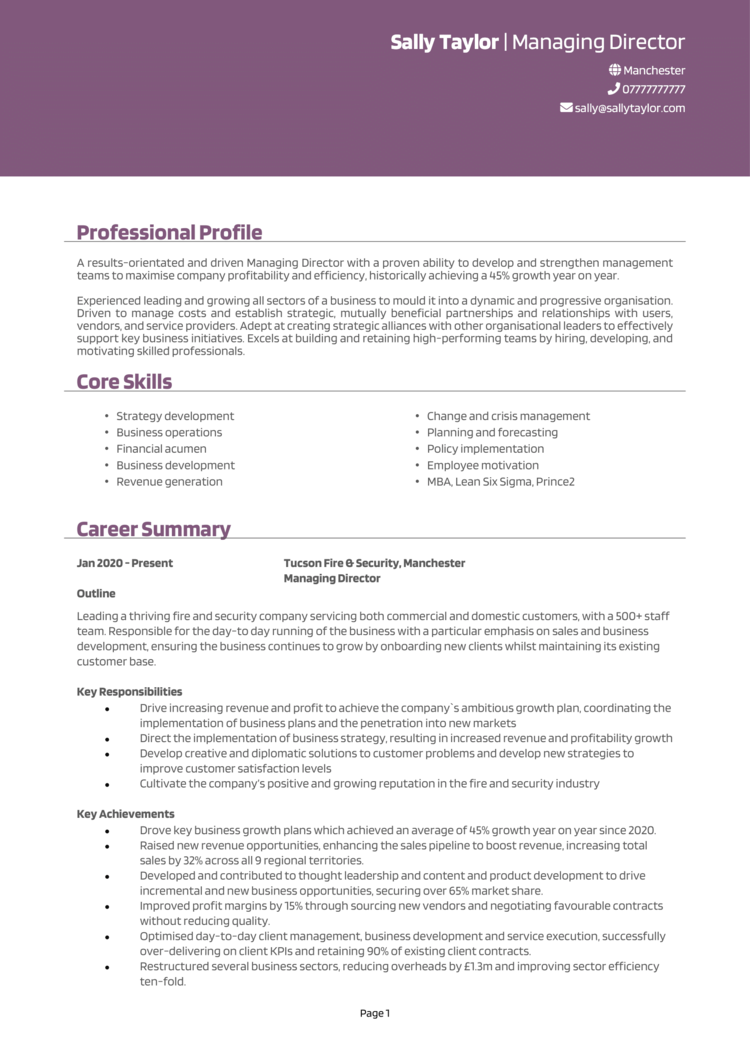
Business Manager CV example
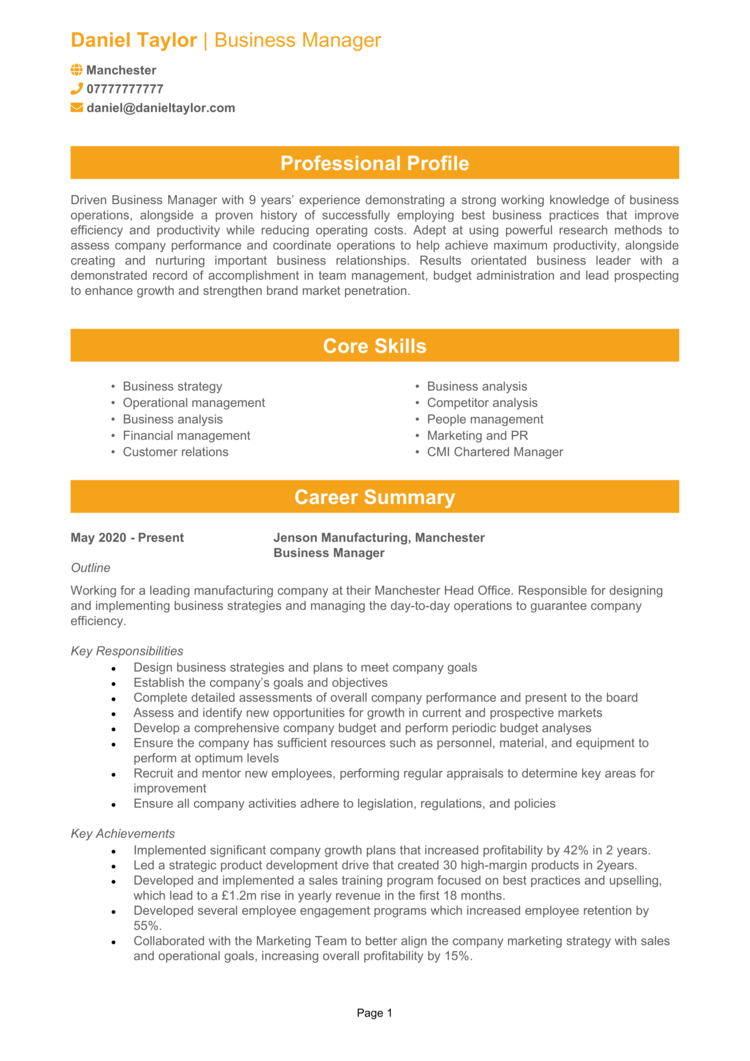
Senior Director CV example
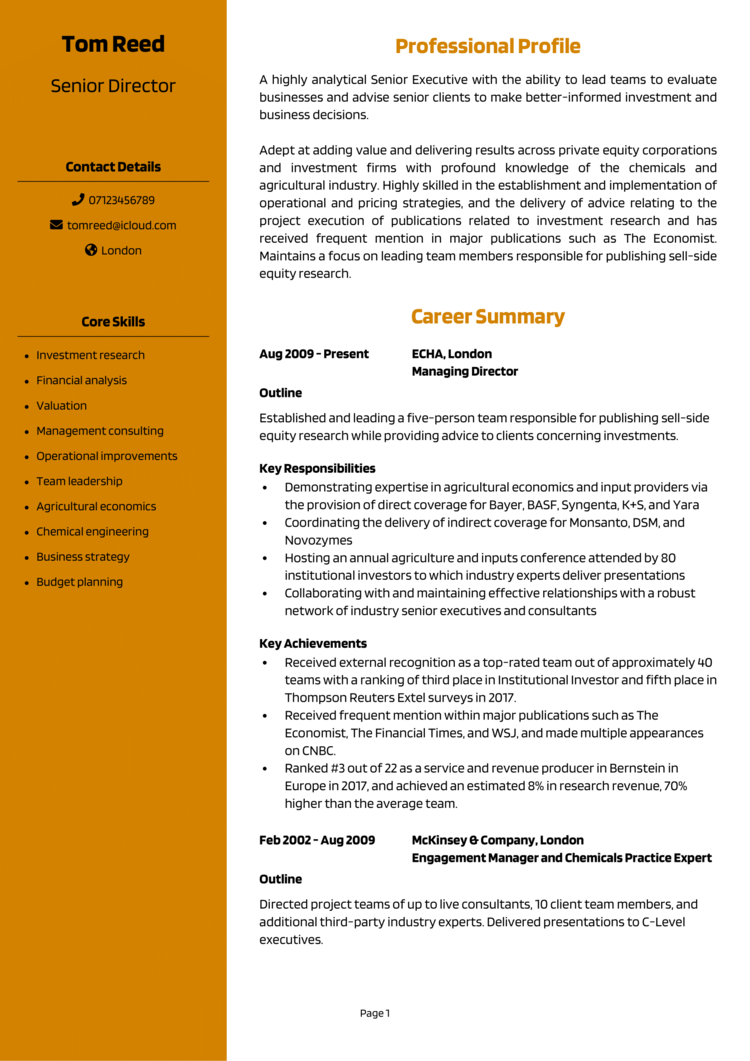
Business Director CV example
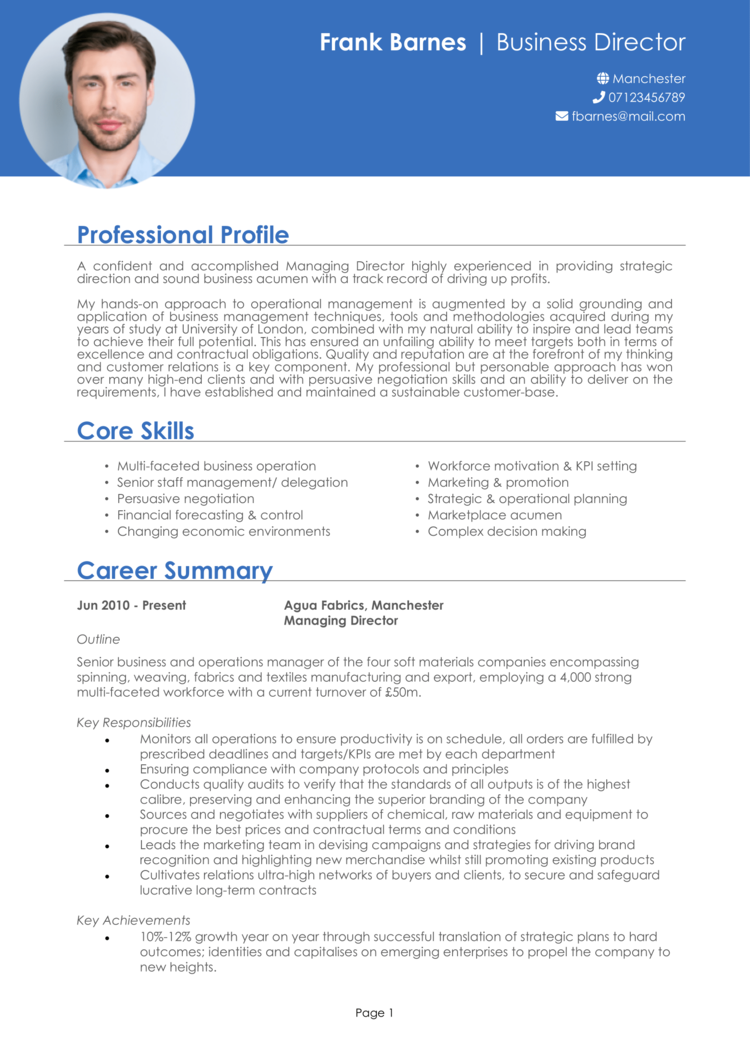
Consultant CV example

How to write your Executive CV
Learn how to create your own interview-winning Executive CV with this simple step-by-step guide.
An Executive CV is not just a list of accomplishments – it’s your first chance to prove your ability to lead at the highest level. Employers want to see that you have the strategic acumen, leadership qualities, and track record of success needed to drive their organisation forward.
This guide will show you how to write a CV that reflects your executive presence, highlights your achievements, and secures your next leadership opportunity.
How to create a good structure for your Executive CV


Think of your CV like a company’s annual report – well-organised and showcasing all the impressive highlights. Recruiters need to find key information quickly and easily: don’t make them hunt for it.
Here’s how to structure your Executive CV:
- Name and contact details – Keep these prominently displayed at the top for easy access. Adding a photo is optional and entirely up to you.
- Profile – Immediately draw in the recruiter with a brief summary of your skills and experience.
- Core skills – State your best qualities at a glance, like your expertise in areas like business strategy, team leadership, and stakeholder management.
- Work experience – Outline your career progression in reverse chronological order, focusing on the results you’ve driven.
- Education – List your academic qualifications that make you the right fit: include professional certifications and any executive training.
- Additional info – Optionally, include hobbies and interests that showcase your character or align with leadership qualities.
Executive CV format


Your CV should reflect the professionalism and attention to detail you bring to your role as an Executive. A poorly formatted CV is like a vague company strategy – it’s not going to inspire confidence or secure investment.
Avoid preventable mistakes to keep the focus on your expertise.
Here’s how to format your Executive CV:
- Bullet points – Use these to present your accomplishments clearly, making key points stand out with ease.
- Divide sections – Clear headings ensure recruiters can easily find key information.
- Use a clean font – A professional, readable font paired with a structured design conveys competence and authority.
- Keep it the right length – 2 pages is the ideal length to present your expertise comprehensively without overloading the reader.
Executive CV profile


Your CV profile is the elevator pitch of your CV – don’t leave the recruiter stuck between floors trying to figure out your value. Summarise your leadership capabilities and strategic achievements, along with the values you strive toward in your leadership work.
Executive CV profile examples
Profile 1
Visionary Executive with over 15 years of experience leading global organisations, specialising in strategic planning, business transformation, and stakeholder management. Skilled in driving multimillion-pound revenue growth and fostering innovative corporate cultures. Proven ability to oversee cross-functional teams of 500+ employees.
Profile 2
Results-oriented Executive with a decade of experience in the technology sector, focusing on operational excellence, market expansion, and corporate governance. Adept at implementing large-scale change initiatives and managing P&L for £100M+ budgets. Recognised for building strong stakeholder relationships and delivering sustainable growth.
Profile 3
Strategic Executive with over 20 years of expertise in financial services, specialising in mergers and acquisitions, compliance, and risk management. Skilled in developing long-term business strategies and leading high-performing teams in achieving corporate objectives.
What to include in your Executive CV profile
Here are some tips on what to include in your Executive profile:
- Where you’ve worked – Highlight your leadership experience in industries or organisations, especially if they align with the company’s sector.
- Your top qualifications – Mention relevant degrees like an MBA or executive leadership certifications.
- Strategic expertise – Reference your ability to drive growth, manage change, or execute long-term vision plans.
- Teams you’ve led – Outline the size and scope of teams you’ve managed, from department heads to cross-functional units.
- Key business outcomes – Highlight your impact on metrics like revenue growth, market expansion, or operational efficiency.
- Stakeholder engagement – Emphasise your track record of collaborating with boards, investors, or key external partners.
- Vision and impact – Convey your ability to set and achieve strategic goals.
Core skills section


Your core skills section is like the executive summary of your CV. It’s where you quickly show recruiters the ‘big picture’ – without the PowerPoint slides.
For Executives, this section should focus on strategic planning, team leadership, and measurable impact. Tailor these to the specific role and organisation you’re applying for.
Struggling to write an executive CV that reflects your leadership skills?
With our CV builder, you can craft a powerful application using industry-specific content tailored for executives, premium templates, and expert tips.
Key skills that make an Executive CV stand out
- Strategic Planning – Developing and implementing long-term business strategies.
- Financial Oversight – Managing budgets, forecasts, and financial performance.
- Operational Leadership – Streamlining processes to enhance efficiency and productivity.
- Business Development – Identifying growth opportunities and driving market expansion.
- Team Leadership – Building and mentoring high-performing teams.
- Stakeholder Engagement – Managing relationships with investors, board members, and key partners.
- Crisis Management – Navigating organisations through challenges and uncertainty.
- Data-Driven Decision-Making – Leveraging analytics to inform strategy.
- Change Management – Leading organisations through transformation initiatives.
- Global Operations – Managing cross-border teams and international markets.
How to write a strong work experience section for your CV


Your work experience section is where you showcase your ability to take organisations from good to great – or, in some cases, from struggling to thriving. Highlight your contributions to organisational success, the teams you’ve led, and the strategies you’ve implemented.
List your roles in reverse chronological order, focusing on measurable outcomes and key contributions.
How to structure jobs

- Outline – Provide an overview of the organisation, your role, and the areas you led.
- Responsibilities – Highlight tasks like setting strategic direction, managing budgets, or driving innovation. Use action verbs like “developed,” “executed,” or “transformed.”
- Achievements – Showcase measurable results, such as revenue growth, cost savings, or successful change initiatives. Include numbers wherever possible to add impact.
Sample jobs for Executive roles
Business Executive | Global Vision Enterprises
Outline
Led the transformation of a multinational organisation, driving £300M+ in annual revenue. Focused on strategic growth, operational efficiency, and fostering a culture of innovation across global teams.
Responsibilities
- Developed and implemented a five-year strategic plan that aligned with market trends and company objectives.
- Oversaw P&L management for £500M+ in annual budgets, ensuring fiscal discipline and profitability.
- Managed a global workforce of 1,000+ employees, fostering collaboration and innovation.
- Built strategic partnerships with stakeholders, including government entities and private investors.
- Launched new product lines that increased market share by 15 percent in under three years.
Achievements
- Achieved a 20 percent revenue growth through successful market expansion initiatives.
- Reduced operational costs by £25M annually by streamlining supply chain processes.
- Recognised by the board for delivering exceptional results in a competitive market.
Manager | NextTech Innovations
Outline
Directed the operations of a £200M technology company, focusing on market leadership and product innovation. Delivered strategic initiatives that enhanced customer engagement and operational efficiency.
Responsibilities
- Developed and executed business strategies that resulted in a 30 percent growth in customer base.
- Oversaw the development and launch of cutting-edge software solutions, achieving £50M in annual sales.
- Collaborated with the executive team to establish KPIs and drive performance across departments.
- Managed relationships with key investors and secured £100M in additional funding.
- Implemented a digital transformation programme that streamlined workflows and improved employee productivity.
Achievements
- Increased annual revenue by 25 percent through strategic product launches and targeted marketing.
- Reduced customer churn by 15 percent by enhancing user experience and support services.
- Delivered a major digital transformation project three months ahead of schedule.
Executive | Elite Financials
Outline
Led the strategic operations of a £500M financial services organisation, focusing on M&A, risk management, and regulatory compliance. Delivered sustainable growth through innovative business strategies.
Responsibilities
- Oversaw mergers and acquisitions worth £1B+, ensuring seamless integration and maximising synergies.
- Developed risk management frameworks that reduced exposure to regulatory and operational risks.
- Directed a team of 300 senior managers and staff to execute corporate objectives.
- Presented quarterly performance reports to the board and advised on investment opportunities.
- Collaborated with global stakeholders to ensure compliance with financial regulations across markets.
Achievements
- Generated a 20 percent increase in shareholder value through strategic M&A activities.
- Achieved a 95 percent compliance rate during audits across multiple regions.
- Recognised for leading a successful corporate restructuring that saved £50M annually.
Education section


The education section is essential for Executives, as it demonstrates the base knowledge and professional development that led to your impressive career. Include degrees, executive training, and relevant certifications that emphasise that you’re the right fit for the role.
List your qualifications in reverse chronological order, starting with the most recent.
The best qualifications to boost an Executive’s CV
- Master of Business Administration (MBA) – Advanced training in business strategy, finance, and leadership.
- Executive Leadership Program Certification – Training in strategic thinking and executive decision-making.
- Chartered Management Institute (CMI) Level 7 – Recognised qualification in senior leadership and management.
- Advanced Finance Certification – Expertise in high-level financial management and strategy.
- Project Management Professional (PMP) – Skills in leading large-scale initiatives effectively.


